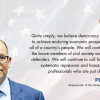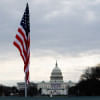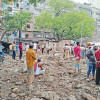Trump’s statement is not based on facts

We, of course, respect the US peoples' right to choose their own leader because we believe in democracy. And we would like to congratulate in advance the winner of the upcoming US elections—whoever that may be. However, as a sovereign country, we expect that the elected leader of the US will be well-informed about the reality in Bangladesh, especially as we seek to not only maintain good relations with the US but take it further forward. In this context, we would like to address the recent remarks by former President Donald Trump, where he referenced "barbaric violence" against Hindus, Christians, and other minorities in Bangladesh. This portrayal is both unfounded and totally contrary to facts, and we hope the US diplomatic team in Bangladesh will provide Donald Trump and his team with accurate information.
The reality is that, following the removal of former autocratic Prime Minister Sheikh Hasina on August 5, Bangladesh has been under a transitional government—one that the Bangladeshi people believe will prioritise democracy and reform. Yes, some instances of unrest have occurred, that also against only one community. But as various media investigations have revealed, they have largely been politically—not communally—motivated. Nevertheless, even those incidents are highly condemnable. However, the number of such incidents were handful and significantly went down once the interim government took office. These incidents have also been greatly exaggerated by segments of some foreign media and social media. For example, an investigative report by the BBC's Disinformation Team confirmed that many videos shared online to portray communal violence against Hindus in Bangladesh are misleading—if not entirely false and manipulated.
In fact, prominent leaders from Bangladeshi minority communities themselves have publicly rejected claims of organised violence against minority communities. They emphasised that recent disturbances had resulted from broader political instability rather than communal tensions. And the chief adviser to the Bangladesh interim government has repeatedly stated that the government is committed to ensuring peace and protection for all citizens—which we strongly support.
From the onset, the chief adviser has invited all foreign journalists, researchers, and experts to visit Bangladesh and conduct their own investigations. We believe this is the right approach. And those who are genuinely concerned about the human rights situation of all groups in Bangladesh should take advantage of this opportunity to carry out their own independent inquiries. Similarly, we hope all US presidential candidates and their teams will perform their due diligence and correct any misconceptions about the situation in Bangladesh.
Bangladesh is committed to restoring democracy and upholding human rights after years of repression. During this critical transition for Bangladesh, we urge all our friends—including the US—to extend us their full support.


 For all latest news, follow The Daily Star's Google News channel.
For all latest news, follow The Daily Star's Google News channel. 









Comments